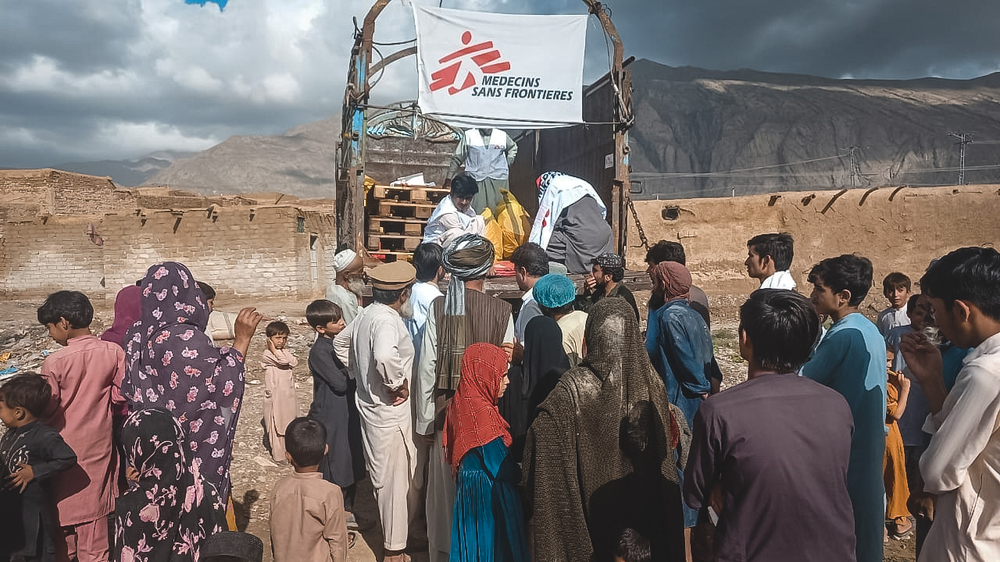Pakistan floods: MSF provides help in some of the areas hardest hit More humanitarian aid needed to respond to massive emergency

Médecins Sans Frontières / Doctors Without Borders (MSF) teams are already in Pakistan, working to adapt our existing medical projects as the situation evolves.
What is happening in Pakistan?
Pakistan is suffering widespread destruction caused by flooding during monsoon rains, with over 70 per cent of the country inundated(UK & US version: One-third of the country is now underwater, according to Pakistani officials.), over 1,000 people dead, over 1,500 injured and at least 33 million people affected. More than one million houses were destroyed or damaged. Southern and central Pakistan have been most affected, particularly Balochistan and Sindh provinces. Pakistan’s meteorological office says the country had been deluged with twice the usual monsoon rainfall, while Balochistan and Sindh provinces had seen more than four times the average of the last three decades. An urgent and increased humanitarian response is needed, prioritising access to safe water and shelter.
What is MSF doing in Pakistan?
The situation in Pakistan is fast-moving and likely to change: the information below is correct as of 31 August 2022.
Balochistan
In Balochistan, 31 districts out of 33 have been severely affected. Areas around Dera Murad Jamali (DMJ) have experienced significant flooding over the last two weeks. Our teams, including staff who’ve had their own homes flooded, responded quickly to provide primary healthcare to people congregating on the roads and in schools; finding many of those who’ve lost their homes have set up makeshift shelters along or near the roadways.
MSF has started mobile clinics in DMJ, providing primary healthcare and health promotion activities, as well as referrals to the MSF-supported District Headquarters hospital, DMJ. Most of the patients treated have presented with respiratory infections, fever, skin diseases and diarrhea. We are also screening for malnutrition and have seen children from our Ambulatory Therapeutic Feeding Centre (ATFC) activities in the mobile clinics. The volume of patients has so far not been huge, especially in the first couple of days, but this is likely due to access issues, with many towns and villages cut off by the floodwater. Our mobile clinics are running daily and the team is currently visiting three locations around DMJ and providing drinking water by setting up water points and non-food items (NFIs including soaps, buckets, cooking utensils, mosquito nets) have also been distributed.
MSF also has projects in Quetta and Chaman, closer to the border with Afghanistan. The team has set up emergency water distribution points in Quetta city and donated approximately 300 non-food item kits. In Chaman, MSF has begun fixing damaged water pipes, distributing NFIs and has started a mobile clinic.
Assessments are also being done in Killa Abdullah district in the northwest of Balochistan province.
Khyber Pakhtunkhwa, Punjab and Sindh
After facing difficulties in reaching the affected population, in part because many roads have been swept away, our teams are now on the ground in the Dadu district of Sindh and have reached camps where people who have been displaced are taking shelter. They are currently assessing the needs and preparing their support. Indications are that around 50 to 60 per cent of houses made of mud have been destroyed by the flood waters and some people are living on riverbanks. There is an urgent need for clean drinking water and hygiene kits and medical care to avoid the further spread of skin infections and diarrhea. Our teams are now preparing for possible outbreaks of water-borne and vector-borne diseases. (UK version:Now, our teams are preparing for possible outbreaks of water-borne diseases such as cholera and insect-spread diseases like malaria.)
We are also assessing the needs in Dera Ghazi Khan and Rajanpur districts of Punjab province, and Charsadda and Nowshehra in Khyber Pakhtunkhwa province.
MSF in Pakistan: Before the floods
MSF has been working in Pakistan since 1986, responding to natural disasters and insecurity and providing access to basic healthcare services.
Today, our medical projects are focused on improving care for pregnant women and children, as well as treating infectious diseases such as hepatitis C, and cutaneous leishmaniasis. We have also been supporting the country’s response to the COVID-19 pandemic and providing care for refugees from neighbouring Afghanistan.
In 2021, our teams assisted over 19,000 births and admitted more than 10,000 malnourished children into therapeutic feeding programmes.





Leave a Comment